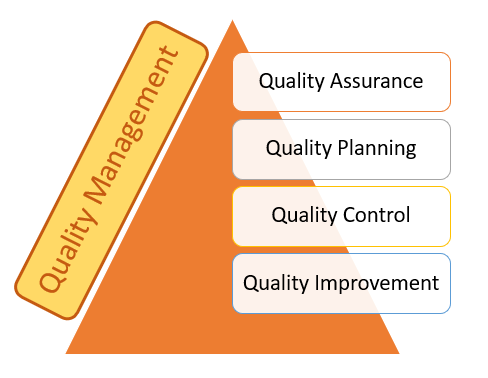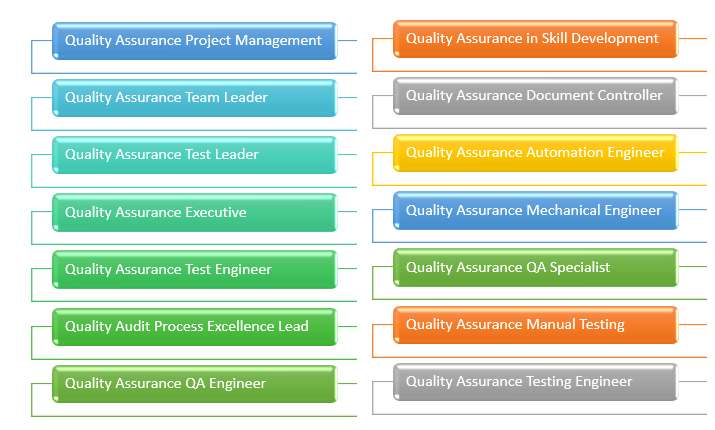Quality Assurance: Roles, Responsibilities & Career Opportunities
Does your product or service meet quality standards? How do you prevent defects and adopt a fool-proof approach? Creating an effective product and ensuring the positive customer experience is more difficult than it seems.
And, that’s what a Quality Assurance professional precisely does!
In this article, you will get to know more about what is quality assurance, different types of jobs available in quality assurance, quality assurance job responsibilities and qualifications, quality assurance team roles and skills, prerequisites for getting a job in quality assurance, and so on.
Also, you will gain insights into the fundamentals of Six Sigma which is considered as a benchmark for excellence in quality assurance.
What is Quality Assurance?
Fit for use or purpose - that’s the mantra lying at the heart of quality assurance.
The systematic process of Quality Assurance (QA) is used to evaluate whether a product or service meets the quality standards.
Quality management has four main components (given below) which altogether help a company deliver a consistent product or service.
-
Quality Assurance: A process-oriented approach that focuses on defect prevention besides ensuring reliable and efficient operations.
-
Quality Planning: The process of understanding factors crucial for the success of a project and doing the needful to satisfy those.
-
Quality Control: A set of procedures that test the output and review the quality of a product against preset specifications.
-
Quality Improvement: A systematic approach that seeks to analyze and improve the quality of your product or service.

How Important Is Quality Assurance in Project Management?
Quality assurance (QA) plays a key role in ensuring the success of a project. It can be particularly useful when it comes to evaluating processes in a project. The presence of a quality assurance professional helps in monitoring and coordinating the quality of a project. Depending on their nature, projects often require rigorous quality control to meet the specific requirements.
Quality Assurance Job Description & Job Overview
A quality assurance executive ensures that the final product adheres to the company's quality standards. These specialists/professionals are responsible for:
-
Evaluation, detection, and resolution of problems
-
Development and implementation of activities on inspection
-
Delivery of satisfactory outcomes
Some quality assurance jobs are as follows:

How To Know More About The Different Quality Assurance Jobs?
Here are some sample quality assurance job descriptions from a few different industries
Quality Assurance Jobs In Manufacturing Industry
◈ Quality Assurance Executive
Job Description: Fittings and High Precision Valves, and Valve Manifold manufacturing Industry
Eligibility: Minimum 10+ years of experience for BE candidates. Experience in relevant industries is a must.
◈ Quality Assurance Engineer
Job Description:
This position will be reporting to the QA Lead. Will be responsible for:
-
Partnering closely with the business & ensuring compliance to quality standards. Assisting in quality management reviews and seeing audit activities.
-
Ensuring timely and accurate entry of product complaints into quality tracking systems. Reviewing and maintaining quality systems and procedures. These should be in accordance with best practice and relevant regulations.
-
Conducting regular quality assurance audits. Following up post-audit to ensure that non-conformities are addressed in a timely manner. Ensuring corrective and preventive actions are effectively implemented.
Eligibility:
-
A degree in Electronics Engineering or related discipline. The candidate should have at least 2 years of experience including solid experience in a similar role.
-
Solid understanding of electronic products. Prior work experience in this industry would be an advantage.
-
Experience in test automation and with tools like Selenium.
-
Ability to work well in fast-paced environments with minimal supervision.
-
Hands-on work experience with performance testing tools is also required.
-
Detail-oriented individual with a solid focus on the quality of work delivered.
-
Good communication skills to liaise with cross-functional teams is required.
Quality Assurance Jobs In Pharmaceutical Industry
◈ Manager Quality Assurance
Job Description:
-
Create and modify company SOPs as needed using Visual SourceSafe software.
-
Train employees in the new/changed SOPs and document individual folders.
-
Ensure that employees are fully trained in their specific job requirements by review of training records.
-
Ensure SOPs are being followed by all employees.
-
Obtain management sign-offs on all new/modified SOPs.
-
Verify test plans exist and are being followed.
-
Participant in audits conducted by existing and potential customers.
-
Maintain the SOP binder.
-
Maintain new and existing employee training folders.
-
Perform audits of vendors critical to the company
-
Other duties as necessary.
Skills:
-
Knowledge of US Healthcare
-
Well-versed with HIPAA & 21 CFR Part 11 validation package audits
-
Experience in working with Clinical Study Protocol, eCRF, ICD & CSR validation
Quality Assurance Jobs In Internet / e-Commerce Industry
◈ Quality Assurance Manager
Job Description:
-
Work with the development and product teams to conceptualize out and implement a comprehensive QA strategy for the products.
-
QA strategy: Drive & execute metric-oriented processes. Drive certification efforts as applicable for ISO, CE, FDA etc.
-
Plan, recruit, train, and manage the test team. Work with external outsourcing vendors to scale capacity. Create the processes and setup tools for bug tracking etc.
-
Have excellent architectural and design knowledge of automation tools. Need to be able to decide and pick the appropriate level of automation and toolset required.
-
Lead the effort to hunt and track down each bug in the system. Identify the bug through innovative methods. Dig deeper into the origin of the bug & fix root causes.
Eligibility and Experience:
-
Certification experience with CE / FDA is desirable.
-
Should have strong conceptual knowledge of Quality Assurance and processes.
-
Drive certification efforts as applicable for ISO, FDA, CE, etc.
-
Need to be able to decide and pick the appropriate level of automation and toolset required.
What Makes You A Great Fit
-
Experience in formal processes of quality-oriented reputed product companies.
-
Certification experience with CE / FDA is desirable.
-
Should have strong conceptual knowledge of Quality Assurance and processes.
-
Must have leadership qualities to mentor and work with Top Management.
Quality Assurance Jobs In Software Industry
The role of quality assurance in software development is critical. Software quality is something intangible but has a great impact on all applications.
◈ Software Quality Assurance Engineer
Job description:
-
Implementing designs and testing them with regards to the MEAN stack application.
-
Proving and Testing that the software meets major architectural requirements.
-
Supporting the software engineers and development team in all phases of software development and testing.
-
Ensure uninterrupted delivery, deployment of code, and the debugging thereafter by building tools and frameworks.
-
Showcase know-how on scalability and performance gauging of a software.
-
Prepare defect reports and report test progress.
Experience & Eligibility:
-
Experience with Protractor, Jasmine, Karma, or similar end-to-end testing tool
-
At least 2 years of experience with Automation Testing or similar role for a MEAN stack application
What Are The Different Responsibilities of A Quality Assurance Professional?
Quality assurance is related to adhering to quality policy. It involves knowing and improving the process to ensure product quality is consistent.
This requires that you know the field that you are working in. It becomes easier if you are a subject matter expert in that industry or field. Also, hands-on experience will help smooth out the improvements. You would have observed this fact while going through the job descriptions given above.
Apart from this, it is critical to have “Buy-In” and support from upper management. Without this, quality assurance maybe just for documentation. There would be more headwinds than tailwinds. So, it is required that it be part of the strategy at the organization level.
It is critical to keep all the stakeholders updated and in sync for this. Testing is required for quality assurance. You need to know the testing methods and processes. This will help measure your quality, defects, and prevent defects. It will help ensure you have consistency in giving out the desired quality outcome. You should be able to decide on testing methods i.e. White box testing, black box testing, automated testing, manual testing, or a combination.
Overall responsibilities of quality assurance professional include:
-
Forming, interpreting, and implementing quality assurance process and standards for the organization
-
Evaluating new and existing regulations. This will help ensure your quality assurance protocols fulfill the requirements
-
Testing
-
Ensuring product quality through regular testing and auditing
-
Internal audit results should be recorded for reference. These will include statistical data about the quality of your product
-
Identifying areas along the manufacturing process or supply chain that can be addressed to improve product safety or quality
-
Framing training processes for everyone who interacts or handles the product
-
Ensuring ongoing risk management and compliance across the organization Measure the quality metrics
Qualifications of A Quality Assurance Professional
Educational qualifications depend on the nature of the industry and the position you are being hired for.
For entry-level positions, it is usually enough to earn a Bachelor's in the relevant field. Having a certification will definitely add value. As mentioned earlier, you need to be a subject matter expert in that field.
If this is related to software, then you might consider earning an Engineering degree in some IT discipline. If this is related to manufacturing, then you may have to be an engineer in that specific field e.g. Electronics, Mechanical etc.
Again, these are general guidelines that most companies look for in their employees who are in quality assurance. These can vary based on organization or industry requirements. A quality assurance manager would need to have:

There are reputed organizations like QAI Global Institute (QAIGI), American Society for Quality (ASQ®), and International Software Testing Qualifications Board (ISTQB®). These provide Quality Assurance certifications.
What Are The Top Quality Assurance Certifications?
Five Top Quality Assurance Certifications are:
-
Certified Test Engineer (CSTE)
-
Certified Software Quality Analyst (CSQA)
-
ISTQB (International Software Testing Qualifications Board)
-
Certified Associate in Software Testing (CAST)
-
CMSQ (Certified Manager of Software Quality)
What Are The Other Skills You Need to Become A Quality Assurance Professional?
Generally, to fulfill quality assurance responsibilities, one would need to be proficient in several skills including:
-
Leadership
-
Organizational and planning
-
Statistical analysis
-
Problem-solving
-
Communication
-
Industry-specific technical knowledge
How Can Six Sigma Help You to Become A Better Quality Assurance Professional
You might already know that the importance of Six Sigma in Quality Assurance is next to none!
Adopting the Six Sigma approach can help you improve your services, processes, and products as well. It helps you to streamline quality control in business processes or manufacturing. The ultimate goal is to have little to no variance throughout.
Quality Assurance professionals trained in Six Sigma play a key role in bringing consistency to quality product outcomes.
Six Sigma theory brings process improvements by using a handy set of tools and techniques. Below are three techniques that stand out as being exceptionally suited for application to the personal domain:
-
The DMAIC Process: Define, Measure, Analyse, Improve, Control: Ensures all-round improvements
-
The 8 Wastes Technique: Cut wastes and save resources
-
The Form-Storm-Norm-Perform Model: This is for team building. It alleviates stress and strengthens personal relationships
How To Be A Productive Quality Assurance Professional With DMAIC Process?
-1.png)
Conclusion
With newer technologies emerging every day, there is an increasing demand for quality assurance professionals. By tracking and monitoring responsibilities, they bring in value for their organizations. The ultimate goal for a Quality Assurance professional is to demonstrate output with metrics. In order to keep up with the industry trends, it is always wise to enhance your skillset and stay up-to-date.
If Quality Assurance interests you, check out our Quality Management workshops here!